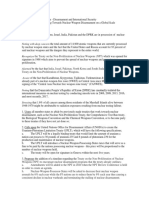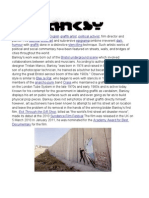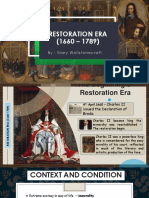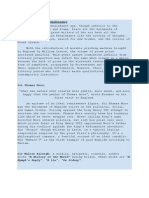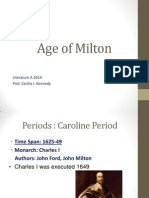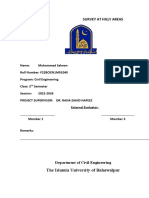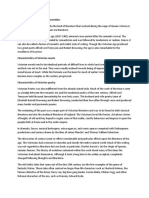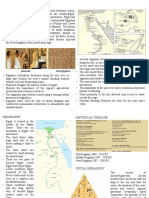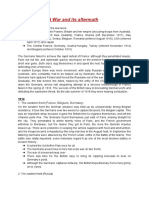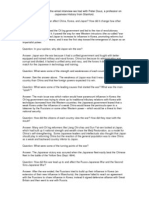Course of World War II
Course of World War II
Uploaded by
Tina DoCopyright:
Available Formats
Course of World War II
Course of World War II
Uploaded by
Tina DoOriginal Description:
Copyright
Available Formats
Share this document
Did you find this document useful?
Is this content inappropriate?
Copyright:
Available Formats
Course of World War II
Course of World War II
Uploaded by
Tina DoCopyright:
Available Formats
February 22nd, 2013
Course of World War II
HITLERS 1ST MISTAKE
Thought the West wouldnt declare war over Polish invasion o Didnt think Britain & France meant their promise of protection to Poland
1939 AUGUST 23
1. Explain the implications of the Nazi-Soviet Non-Aggression Pact Hitler believed he could enter Poland without fear of Russian resistance ~ free hand in Poland o Germany could dominate all of Germany Stalin could invade & divide Poland o Would add buffer state to USSR ~ in case of German attack
SEPTEMBER 1
Germany invaded Poland o Staged fake attack at Gleiwitz Radio Station ~ Polish troops that attacked Germans were actually concentration camp people dressed in Polish uniforms Polish thought they had a strong army ~was wrong o Britain & France regretted decision in defending Poland ~ would have preferred to help Czechs (who had the stronger army) Polish Army defeated because: o Element of surprise (Blitzkrieg) ~ couldnt cope with speed & scope of Blitzkrieg o Still relied heavily on cavalry (versus German tanks) o Most of airforce destroyed on the ground o USSR invaded September 17 from the east 2. What was Blitzkrieg & why was it so successful? Lightning war based on speed of tank & motorized infantry o Essence was element of surprise Successful because enemies would be completely caught off guard & unable to reciprocate action because their forces were destroyed o Attacking specific areas that would cripple enemy offense Would only work if Germans had continuous access to oil o Germany imported oil from Romania ~ Ploesti oil fields Without oil, it would cause blitzkrieg to collapse
SEPTEMBER 3
Britain & France declared war on Germany but did not attack 3. What preparations did they make? Why did they not take any action? France ~ built Maginot Line British ~ had royal navy & English Channel (anti-attack barrier) o Planned to launch naval blockade against Germany France & Britain stepped up pace of munitions production o Also called up conscripts o Issued civilians with gas mask & steel sheets for back-garden shelters
February 22nd, 2013 Churchill, First Lord of Admiralty & in charge of British Royal Navy drew up plan to seize the port of Narvik in neutral Norway o 80% of Germanys iron ore arrived from Sweden through this port Britain ~ did not take action because: o did not want to lose world sympathy by attacking a neutral state o saw war was defensive, not offensive Britain also sent over 200,000 BEF troops to part of Belgium ~ expected Germany to repeat Schlieffen Plan. o Germany didnt smash through Maginot Line Instead went through Ardennes ~ unprotected area of France
SEPTEMBER 10
Canada & other self-governing dominions declared war on Germany
SEPTEMBER 17
USSR invaded Poland 4. Why? Nazi-Soviet Non-Aggression Pact also had clause to invade and divide Poland between the two countries Stalin wanted his share of Poland o Gain a front line further to the west (buffer state) ~ in case Hitler one day would turn against Stalin Regain USSR territory previously lost in war USSR invaded Finland ~ Winter War 5. What were the reasons for the war? Describe the events of the war. Finland had previously belonged to Tsarist Russia o USSR wanted to regain lost territory USSR wanted to protect Leningrad ~ fear of Finnish Nazi attack USSR tried to bully Finland into parting with territories o These would improve the defensive position of Leningrad Finland refused ~ Russians invaded Red Army brought struggle end o Finnish territories added to Soviet Union in March 1940
NOVEMBER 30
1940 MARCH 13
Finland made peace with USSR 6. What territory did the Soviets gain & what weaknesses did it show about the Red Army? Soviets gained: o Entire isthmus of Karelia & land north of Lake Ladoga Included: Finlands 2nd largest city of Viipuri Much of Finlands industrialized territory
February 22nd, 2013 Significant parts still held by Finlands army Finnish army managed to hold back Soviet Army for 4 months o Showed that USSR army was severely weakened by purges
APRIL 9
Germany invaded north to Denmark & Norway 7. What were the 2 main purposes? Secured more iron ore supplies Controlled Norwegian fjords ~ prove as excellent bases for attacks on British shipping o Built many bases along coast line ~ would serve to launch future attacks on Britain
8. Why did the American journalist, Edward R. Morrow, call the period of the fall of 1939 to the spring of 1940 the Phoney War? (Sitzkrieg) There was no fighting on land at all o Britain & France declared war, deployed troops, but did nothing else
MAY 10
Germany invaded Belgium, Luxembourg, the Netherlands & France o Launched blitzkrieg ~ swept through Netherlands, Belgium & cracked French defences Hitler chose to launch attack on France along section of frontier where Western Allies least expected it River Meuse to Ardennes Mountains ~ not protected o French believed that this sector had more than adequate natural fortifications o Luftwaffe destroyed much of French Air Force on May 10 o Maginot Line turned into expensive stretch of useless concrete & steel Trapped 13 French divisions, 9 BEF divisions & whole of Belgian army against the sea o May 15 ~ Netherlands surrendered o May 28 ~ Belgium surrendered British troops retreated ~ King Leopold asked for an armistice Churchill became Prime Minister of Britain o Formed new National government ~ coalition which included members of Labour Party, Conservatives & Liberals
MAY 27 JUNE 4
Evacuation at Dunkirk (Operation Dynamo) Plan to rescue trapped British & French troops from the beaches of Dunkirk, France o Expected to save only 45,000 men before Germany would come in for the kill By June 4th, over 330,000 men had been ferried to safety across the Channel o Royal Navy, merchant ships and armada of pleasure boats helped carry troops to safety British & French lost all of tanks, heavy artillery and other equipment stationed there Was a major break for the Allied troops
HITLERS 2ND MISTAKE
Hitler stopped main thrust (for Luftwaffe), but he should have captured British Army (B.E.F.)
February 22nd, 2013
JUNE 10
Italy declared war on Britain & France Norway surrendered Mussolini felt if he waited too long, he couldnt share the spoils of Hitlers victory o Said I need 1,000 dead in order to take my seat at the table with the Allies Italian forces outnumbered French forces 2:1 ~ but invasion stopped o French managed to hold Italian troops back
JUNE 15 17
USSR invaded Baltic States of Latvia, Lithuania & Estonia o All part of Non-Aggression Pact with Germany Was Stalins chance to regain territory lost during Civil War o Added more buffer zones to USSR, in case of German attack
JUNE 22
France signed armistice with Germany (in same railway carriage used in World War I) o War lasted about 6 weeks 9. List 5 major reasons why France was defeated. Blitzkrieg tactic worked too well o France completely surprised and unable to reciprocate attack Defensive strategy of army generals ~ failed o Wrong mentality ~ believed they were safe behind Maginot Line Luftwaffe simply flew over it o Hitler attacked through unprotected area of Ardennes Internal Political instability o Government unable to concentrate on fighting Germans ~ were too busy fighting amongst themselves Divided command o Belgium didnt want to put troops where British & French troops were Wanted to be neutral ~ refused to coordinate with Allied forces in fear of German attack Fleeing refugees prevented deployment of French troops in trapped in Maginot Line o Other troops unable to contact those trapped Needed backup in order to engage with Germany
February 22nd, 2013 10. Explain the political & territorial settlement imposed on France by Germany
French Puppet state of Vichy set up o Marshal Petain (WWI General) became leader At first, was a semi-independent state ~ soon collaborated with Nazi Very controversial at end of the war Britain recognized Vichy as an official French government o Didnt want to acknowledge that all of France was under Nazi rule By recognizing partition, could not recognize De Gaulle as exiled leader of France De Gaulle was deemed leader of fighting group, the Free French o Treatment would never be forgotten by De Gaulle When he became President, prevented Britain from entering Common Market (early EU ~ European Union) Frances fleet sent to French ports in North Africa were destroyed by British o Britain feared Germans might use it against them o On July 3rd, Royal Navy attacked ships at Mers el-Kebir Killed 1,300 French sailors
JUNE 27
USSR invaded Romania Annexed Bukovina & Bessarabia Only agreed in Nazi- Soviet Pact that they could have Bessarabia o As it was Russian territory prior to WWI Hitler became more leery of Stalin o Thought Stalin was trying to cut off Germanys access to oil ~ would end Blitzkrieg o Hitler planned to attack USSR sooner, rather than later
JULY 10
Battle of Britain began (Operation Sea Lion) Whoever controlled the skies controlled Europe o Control of the skies would enable Germany to later launch a sea invasion of Britain
February 22nd, 2013 11. Outline the objectives/stages in Battle of Britain July 10 August 12 1940 (First month) o Luftwaffe attacked British convoys in English Channel o R.A.F. concentrated on building up its fighter strength Production reached 500 a month in July After August 12 (3 Weeks) o Germans concentrated on bombing radar stations & forward fighter bases o German fighter escorts took heavy toll on British aircrafts & pilots o Luftwaffe struck at inland fighter bases & aircraft factories Had Goering stuck with this tactic, the RAF would have been unable to get enough fighters in air September 7 mid November (Last 2 months) o Luftwaffe attempted to bomb London into submission Partly in revenge for a British raid on Berlin on August 25 Gave RAF enough time to repair bases & get fighter number up again o September 15 ~ Goering launched final massive air assault 60 German planes show down Blitz on London went on for 57 nights o September 17 ~ Hitler postponed invasion until further notice o October 12 ~ Hitler postponed until January 1941 January ~ Operation Sea Lion called off
SEPTEMBER 7
German Blitz of London & other British cities 12. What was The Blitz Sudden/intense military attack Early September mid-November London subject to intensive bombing o Over 13,000 tonnes of high explosive dropped on the capital Over 13,000 people killed November 14 ~ Luftwaffe attacked cities of: o Coventry ~ 449 bombers attack / 554 people killed / 865 injured o Plymouth o Southampton o Hull o Bristol o Liverpool o Manchester o Birmingham o Glasgow Total of 43,865 died in raids before end of 1941 ~ 20,000 from London 13. The Blitz represented a significant change in strategy by Goerings Luftwaffe. Why the change in strategy & why did it eventually prove fatal to the planned invasion of Britain? English Channel ~ anti-barrier o Needed to control skies in order to attack Britain Fatal ~ Goering changed from tactical to personal o Wanted revenge for British attack on Berlin Left behind tactical attack on British aircraft factories & airfields to attack civilians
February 22nd, 2013 o Germans thought they could afford casualties By end of Battle of Britain, lost 1,733 aircrafts, compared to 1379 of Britain o Hitler realized futility of tactics change ~ postponed and later cancelled invasion of Britain
HITLERS 3RD MISTAKE
Germans seemed to be winning the war, but turned to attack British cities, rather than airfields / plane factories Germany postponed Operation Sea Lion until spring of 1941 o Was never resumed Britain was alone ~ not seen as a threat to Germany Germany changed focus to attack real enemy of USSR
OCTOBER 12
AUGUST 3 19
Italy invaded British Somaliland While Germany attacked Britain, Italy felt it was time to go on war of conquest to build up empire before Britain surrendered o Thought it was only a matter of time o Mussolini knew he wasnt adequately prepared but went ahead anyway Italian setbacks would later divert German troops to aid Mussolini o This delayed German plan to invade Soviet Union
SEPTEMBER 1941- MAY 1944
Battle of the Atlantic Import of material & supplies were Britains lifeline o Germany set up naval blockade Was on-going struggle to keep sea-lanes to North America open Wolf packs (submarines) did most of the damage By late 1941, looked like Germans were gaining upper hand o By mid-1942, Hitler was sinking hips faster than Allies could build them Turning Point ~ Spring of 1943 o Radar on naval support groups with long-range flight capabilities guided ships Closed mid-Atlantic gap o USA occupied Iceland ~ July 1942 o Allied ships organized into Convoys with escorts & anti-sub weapons Was very effective June August 1943 ~ sank 73 U-Boats (over half sunk by aircraft) Without victory here, USA industrial strength could have done little in struggle against Axis powers German Admiral Doenitz ~ called off U-Boat attacks in late 1943 few were left Enigma Decoder o German armies used the Enigma Decoder to keep their communications secret Army, navy, & air force all used the device o British troops managed to break the codes, exploit weaknesses of machine and decipher the German communications German forces lost element of surprise
February 22nd, 2013
SEPTEMBER 13
Italy invaded Egypt o Were driven back 3 months later
SEPTEMBER 16
US military conscription bill passed ~ USA began moving away from isolationism
SEPTEMBER 27
Tripartite (Axis) Pact signed by Germany, Italy & Japan Agreement between the 3 countries for the next 10 years to aid & cooperate with each other in their respective goals o Would assist one another with all political, economic & military means if one of the powers is attacked (excluded the Soviet Union)
OCTOBER END OF WAR
Strategic bombing of Germany Purpose was to: o Keep Allies fighting in the West o Limit German war capacity Targeted factories (precision bombing) & cities (area bombing) o Attempt to demoralize enemy (met with limited success) Early bombing raids (1940-1941) were very inefficient o Led to night bombing raids o New technologies ~ navigation, long range heavy aircraft were developed by 1943 Newfound ability to achieve total destruction of German cities & disrupt civilians Idea of total war Policy of mass bombing raids first initiated on the thousand-bomber raid of Cologne in April 1942 Bombing over next 3 years killed 600,000 civilians & destroyed over 3.3 million homes in every major German city British loss of aircrew high in 46,000 Strategy: o Creation of firestorm Extremely damaging ~ if perfect, could achieve up to 800 C Would suck all of the oxygen out of air & suffocate people o Hoped to demoralize enemy & kill factory workers Effectiveness o Not very effective o Damaged cities were rebuilt quickly ~ after bombers moved on o 1 in 3 deaths was a factory worker o Extremely expensive campaign
OCTOBER 7
Germany occupied Romania o Would guarantee German protection against USSR Romania forced to cede territory to Hungary & Bulgaria
February 22nd, 2013 14. What was the main purpose behind the invasion? To secure the Ploesti Oil Fields ~ keep Blitzkrieg going 15. What effect did this have on Soviet-German relations? Strained relationship Stalin was upset ~ border area with Germany increased o Stalin worried about German intentions to seize USSR oil supply
OCTOBER 28
Italian troops invaded Greece 16. What was the purpose? Mussolini wanted to get into the Eastern European dismembering o Create Mediterranean Empire (idea of Mare Nostrum) Italians couldnt defeat Greeks ~ were pushed back into Albania o Greece requested & obtained British Military aid. British troops landed in Crete 5 months later Spring 1941 ~ Germans needed to send troops to help Mussolini o Delayed invasion of USSR & North Africa
NOVEMBER 5
Roosevelt re-elected as US President ~ for 3rd term
NOVEMBER 20
Hungary joined the Axis Powers o Tripartite/ 3 Power Pact Had little choice ~ if they didnt join, would risk invasion & be over-run by Hitler o Got in on the winning side & reap future spoils Hitler began forcing the Fascist States of Eastern Europe into his fold o Balkan states were extremely dependant economically on Germany Since the 1930s ~ now they would be politically tied to Germany Hungary hated the Treaty of Trianon as much as Germans despised Treaty of Versailles
NOVEMBER 23
Romania joined the Tripartite Pact 17. What was the purpose? It was already occupied by Germany ~ had little choice Germany needed the oil reserves at Ploesti to keep war machine & blitzkrieg going
DECEMBER 11
Britain drove Italians from Egypt Italians needed help ~ Hitler sent troops & Field Marshall Rommel (Desert Fox) o Diverted German troops to North Africa
February 22nd, 2013
1941 JANUARY 15
British soldiers invaded Ethiopia Italians driven out within 3 months o Showed how weak Italian army was without German help
FEBRUARY 9
Germany occupied Bulgaria o A month later ~ Bulgaria joined Axis Powers
FEBRUARY 12
German General Erwin Rommel (Desert Fox) arrived in North Africa Units of German Afrika Korps arrived 2 days later to help Italians
MARCH 11
American Lend-Lease Act became law 18. What were the American Neutrality Laws & explain their purpose Authorized president to place an embargo on both belligerents in the event of war o Any 2 countries involved in war (attacker & victim) would not be able to trade with USA Ensure Americas isolationism & practice of non-intervention 19. Who were the Lend-Lease Laws intended to benefit? The Allied nations o USSR ~ USA extended 1 billion dollars in credit to defend itself from Nazi German in November 1941 USA would supply Allied Nations with material/supplies o Lend military equipment/materials ~ but did not do any fighting Ended the depression in the USA o Also ended USA policy of isolationism 20. How did Cash & Carry differ from Lend-Lease? Cash & Carry involved cash o Friendly nations could buy US materials with money Intended to help Britain o Dominion of Canada would help buy bullets for Britain o Britain, soon went bankrupt Thus led to creation of Lend-Lease laws 21. What was the opinion of the American public & Congress to the European War? How did this differ from President Roosevelts attitude? Public & Congress ~ did not want to get involved in foreign conflicts Roosevelt ~ wanted to do something to help stop Hitler believed that US could be the Arsenal of Democracy o Would help supply weapons/munities/artillery to democratic states involved in war
February 22nd, 2013
MARCH 5
Bulgaria joined Axis Powers o Yugoslavia joined on March 25th ~ coup by military leaders overthrew the pro-Nazi government Partisans (communists) fought against Nazis in Serbia Prince Paul was replaced by King Peter II Yugoslavia was not to fall willingly into Nazi orbit o Hitler needed to clear way for the invasion of Greece so both would need to be attacked Yugoslavia would be taken by force o Plan for fascist countries to invade/overrun Baltic States & annex large parts of Yugoslavia
MARCH 7
British forces arrived in Greece ~ landed in Crete o Worried Germans ~ British could bomb oil fields in Romania
APRIL 5
Britain drove Italians from Abyssinia
APRIL 6
German invaded Yugoslavia & Greece o Known as Operation Retribution
22. What was the purpose? Yugoslavia revolt against joining the Axis Powers & failure of Italian invasion of Greece caused Hitler to invade them both o British occupation of Crete made Hitler fear that it could bomb Romanian oil fields from Crete Yugoslavia o Conquered in 10 days o Country was divided amongst Germany, Italy, Hungary & Bulgaria o Croatia became a puppet state ~ Ustasha Croatian Fascists o Serbia was occupied Partisan fighters (communists led by Tito) kept high number of German occupation troops there Greece o Conquered in 20 days Crete occupied by Axis troops by June 2nd British forces forced to evacuate o Greece kept mostly under Italian occupation o Invasion of Balkans forced delay in attack of USSR by 6 weeks
JUNE 14
United States froze German & Italian assets in America
JUNE 22
Germany invaded USSR ~ Operation Barbarossa (a 4,800 km-long front)
February 22nd, 2013 Goals: o Lebensraum ~ Living space for Germans o Vast resources ~ food & raw materials Ukraine was the food basket of Europe o Destroy communism Stalin had prepared for war with Nazi Germany ~ but didnt have specifications for attack o War in East was to last 4 years & involved 8 million soldiers Stalin ignored reports of troop-build up in Nazi Germany from British & USA o Believed that they were trying to drive Stalin into mobilizing Like Tsar ~ driven to mobilize in WWI o Pathologically untrusting of Britain ~ didnt believe that Germany would attack USSR In reality, Hitler was concentrating troops & preparing to invade USSR Stalin believed that Japan would attack/invade USSR ~ because of Anti-Comintern Pact German Strategy: o series of Blitzkrieg movements to encircle huge Russian Armies & destroy them o involved 3 million men, 3,500 tanks & 5,000 aircraft o Three Pronged Attack: Army group North ~ drive towards city of Leningrad Attack Russian industry & armament centre Army group Center ~ capture capital city of Moscow Army group South ~ capture Ukrainian wheat & oil fields of the Caucasus Secure resources Blitzkrieg worked extremely well at first o 3 Soviet division annihilated by end of 1st day o Most Soviet planes destroyed on ground o Hundreds of thousands of Soviet troops taken as prisoners Many welcomed Germans as liberators o Felt relieved to be free of Stalin & communism o Hitler hoped for a revolution to overthrow the Bolsheviks throughout USSR Hitler felt that USSR would surrender, due to heavy losses in 1st few weeks
HITLERS 4TH MISTAKE
Failed to take advantage of anti-Russian attitudes of Ukrainians & other Soviet minorities o Declared them as inferior Slavs
JULY 3RD
Stalin ordered Scorched Earth Policy & moved Soviet industry east o Burned crops & villages, slaughtered livestock & poisoned wells ~ prevent Nazis from living off the land in their rapid advance Stalin began dismantling of whole factories o Moved them & works East of the East of Ural Mountains Industrialization of 5 Year Plans helped save the USSR Railway gauge different (wider)
February 22nd, 2013
AUGUST 20
Army Group North ~ very successful Nazi siege of Leningrad o Surrounded it on August 20th ~ 9 weeks Start of 900-day siege o 800,000 Soviets killed More than combined total losses for Britain & USA during entire war Army Group Center ~ very successful but did not reach Moscow (200km away) o Drive to Moscow stopped in early October & diverted to aid Army Group South Were 200km away from Moscow when diverted ~ allowed USSR to build tank traps Gave Stalin time to prepare ~ time for space o Stalin began to make appeals to the people with Nationalism Compared Nazi invasion to Napoleon Called it Great Patriotic War Reopened churches ~ Mother Russia Stalin stayed in Moscow ~ morale boost for the people (didnt flee the city)
HITLERS 5TH MISTAKE
Diversion of armies south ~ away from Moscow o Delay to capture capital proved fatal
OCTOBER
Resumed drive to Moscow
OCTOBER 11TH
First snow arrived in USSR ~ roads turned into mud o There were few paved roads in USSR Motorized vehicles of Blitzkrieg became useless ~ only tanks could pass
MID-OCTOBER
Stalin finally believed his spies in Japan ~ Japanese interests were in Pearl Harbor, not USSR o Stalin had been awaiting Japanese attack since June, 1940 Stalin began to transfer 40 divisions of Siberia Front to Moscow ~ under General Zhukov o Hitler didnt know about these divisions o Trained to fight in winter conditions
LATE-OCTOBER
Ground froze ~ momentum of Nazi troops regained o Hitler ordered re-offensive once mud froze ~ provided USSR with more time o Got to within 30km of Moscow ~ many felt that Moscow would fall
DECEMBER 5
German Wehrmacht attack on Moscow abandoned 23. Why? Russian winter set in
February 22nd, 2013 General Zhukov launched Russian counter-attacked German troops unprepared for the cold weather machinery & artillery did not work Serbian troops attack on December 6 ~ capture/kill 300,000 Nazi troops Significance of Easter Front WWII o At least 75% of Germanys troops & war material was sent to Russian front By June 1944, tied down 228 German & Axis divisions (4 million men) & 5,250 tanks German western divisions equalled 61 at the time 24. What were the political, economic, & military advantages & disadvantages to invading the USSR? Advantages USSR weak & unprepared for war ~ Army suffered severely from purges Would give Hitler a 1-front war Take over Soviet resources/food & raw materials Use of anti-communist sentiments Disadvantages Sheer size of USSR ~ prevent success of Blitzkrieg Harsh conditions of winter USSR had vast resources ~ beyond of Hitlers reach Soviet army was largest in world ~ 3rd 5 Year Plan extremely successful Soviet tanks outnumbered & airplanes equalled the rest of the worlds combined
Errors: o Army group Center diverted to help Army group South Rapid advance of Moscow slowed Final offensive for Moscow resumed in December ~ Siberian troops had already arrived Moscow saved ~ decision to divert against desires of German High Command o Severely underestimated Red Army forces Thought that there were 140 divisions ~ actually 320 (Hitler didnt know of Siberian numbers) o Hitler expected to secure bulk of Russian industry Stalin had most of removed before Germans arrived
JULY 7
USA occupied Iceland ~ desire to close mid-Atlantic gap Japan occupied Saigon, French Indo-China o Enlarging of Japanese Empire ~ was French colony but given to Japan by Hitler as gift Strategy to fly from North America to Britain & deprive Hitler of another conquest o Resulted in Battle of Atlantic
JULY 12
Mutual Assistance agreement signed between Britain & USSR
February 22nd, 2013
JULY 26
Roosevelt froze Japanese assets in America & suspended relations
AUG 14
Atlantic Charter signed by Churchill & Roosevelt on coast of Newfoundland o Was 1st meeting between major leaders 25. Give the purpose & main terms of the Charter Statement of War Objectives & Aims of war ~ like 14 Points of WWII Beginning of US & British alliance ~ was the foundations of Cash & Carry & Lend-Lease Laws o America was not yet in the war ~ unwilling to let Britain go under
DECEMBER 7
Japanese bombing of Pearl Harbor o Destroyed the US Pacific Fleet 26. What was the Japanese strategy behind the surprise attack? Knock out U.S. Pacific Fleet Overrun southeast Asia ~ go on war of conquest o Control seas ~ gain control of resources & get rid of naval rivalry Make America weak enough so that it would be unable to fight against Japans campaign in southeast Asian empire Plan was not to get US into war but remove threat of American Navy for plans of war of conquest Believed it would post-pone any American threat by at least 1 year o In reality ~ the US fleet was rebuilt in 6 months Attack: o Japan ~ 6 aircraft carriers, 423 planes Battle Cry ~ Tora Tora Tora (Tiger, tiger, tiger) 1st Wave: at 6a.m. 183 Japanese planes took off 230 miles north of Oahu At 7:02 approaching air attack detected on radar o Junior officer disregards report ~ believed they were American B-17 bombers (which were expected from US West Coast) nd 2 Wave: at 7:15, 167 Japanese planes take-off Damage: o Japanese damaged 8 battleships 5 were sunk & 2 permanently lost o All 3 US aircraft carriers were out at sea ~ for war of conquest to succeed, Japanese needed to crush Americans Aircraft carriers were key to winning war in Pacific 27. Was an attack by Japan expected? If so, where? Not in Hawaii ~ believed to be a colony in Philippines
DECEMBER 8
USA declared war on Empire of Japan o Roosevelt: A day which will live in infamy Japan occupied Thailand (Siam) & attacked British Malaysia Canada became first nation to declare war on Japan
February 22nd, 2013
DECEMBER 10
Germany and Italy declared war on USA ~ Prevented USA from having to declare war on them 28. Why? Part of Tripartite Pact ~ agreement to protect & come to aid of each other
DECEMBER 19
Hitler took complete personal control of the German Wehrmacht
DECEMBER 25
Japan invaded Hong Kong
1942
Decisive year ~ Battles of Midway, Stalingrad, El Alemein o Beginning of defeat of Axis Powers
JANUARY 1
United Nations Declaration signed by 26 Allied nations in Washington
JANUARY 2
Japan invaded the Philippines
JANUARY 20
Wannsee Conference (Final Solution) o Decision made by Nazis to figure out what to do with Jews o S.S. Obergruppenfuehrer Heydrich coordinated Final Solution to Jewish Question Elimination of 11 million Jews from Europe & Soviet Union o Infamous due to meticulous tabulation of Jews Country, definitions (degrees of Jewish blood), etc. & how they would be transported o Europes Jews would be combed from west to east From Greater Germany, occupied countries & collaborating governments Emigration of Jews had been recently prohibited due to dangers of it during war & other possibilities in the East Evacuation of Jews to East ~ detailed country by country list of Jewish numbers o Over 11 million o Evacuated Jews to be sent first to transit ghettos in the east Once in east, would be separated by sex & taken into work columns to be worked until death Jews from Germany over 65 sent to old age ghetto at Theresienstadt concentration camp along with severely wounded Jewish veterans with war decorations (Iron Cross) o Didnt anticipate any problems from Slovakia, Croatia, Romania & Occupied France o Wanted to send an expert from Race Settlement Main Office to Hungary to actively work with the local police Force an advisor for Jewish Question onto Hungarian government
February 22nd, 2013 o Scandinavian Jews seen as small population & actions here to be deferred Lengthy discussion on definitions of Jews moved o Mixed blood, degrees of mixed blood, marriages of mixed blood with or with children, etc. o Preparatory activities for the final solution to be carried out immediately in those territories Avoid alarming general population Japan invaded Burma Singapore surrendered to Japan
FEBRUARY 8
FEBRUARY 15 MARCH 7
Japan occupies Dutch East Indies (Indonesia) Why? For possession of rubber & oil When Japan overruns various regions of Asia, reason is to: o Obtain greater east Asian co-prosperity sphere & Asia for the Asians Liberate Asian states run by foreign European powers
MAY 7 8
Battle of Coral Sea o Battle of airplanes vs. airplanes ~ aircraft carrier vs. aircraft carrier o Prevented Japanese invasion/attack on Australia Mass murders of Jews by gassing began at Auschwitz
JUNE
JUNE 6
Japan failed to conquer Midway Island 29. Explain the results & significance of the Battle of Midway Americans sank 4 Japanese carriers & 296 planes o Almost of all Japanese aircraft carriers USA only lost 1 carrier & 132 aircraft Battle of Midway put halt to Japanese victories o Turned tide against Japan Turning point of war in Pacific o Japan no longer on the offensive 30. Explain the American strategy of Island Hopping which characterized the Pacific War Avoid trying to capture all of enemy occupied lands ~ by-passed more heavily defended islands o Strategic victory at Battle of the Philippine Sea Cut off Japan from oil supplies Americans wanted to get close enough to Japanese mainland & bomb it/ launch attack o Islands came at high price (terms of loss of life)
February 22nd, 2013
AUGUST 19
Canadian attack on Dieppe 31. What was the purpose of this action? Test before full-scale invasion of Europe o Allied troops wanted to see how well-defended Hitler was Gather info from German forces there 32. What were the results? British supposed to bomb from air while 6,000 (mostly Canadian) troops & 50 tanks used landing crafts o Goal was to capture port in 12 hours then take out German prisoners & gain info about German defenses Dieppe Raid was disaster o At end of 9 hour raid: 907 Canadian troops dead 1,874 taken as prisoners o Was a valuable military lesson about invasion of continent Learned that they couldnt attack a channel port city ~ was too heavily defended by Hitlers Fortress Europe (Festung Europa or West Wall) Series of heavily defended positions Allied troops used what they learned later at Normandy Landings ~ landed on beaches instead Hitler transferred more troops to North-east France afterwards o Eased pressure on USSR
SEPTEMBER 12
Battle of Stalingrad began o Lasted 5 months ~ until February 2nd, 1943
JULY 1
Germany began invasion of Egypt 33. The German Africa Corps under General Erwin Rommel originally arrived to aid Italians. What did both countries hope to gain by capturing Egypt? Control of Suez Canal & oil in Middle East Disconnect British from vital shipping connection to Far & Middle East o Stage set for major turning point battle ~ Montgomery VS. Rommel Britain drove German forces from Egypt o Germans defeated at Battle of El Alamein El Alamein only 100 km from Suez Canal o Rommel defeated ~ German & Italian troops retreat across North Africa towards Tunisia Chased by British General / Field Marshal Montgomery Germans were trapped ~ Rommel & 1,000 men managed to escape to Europe
NOVEMBER 3
February 22nd, 2013
NOVEMBER 8
Operation Torch began o U.S. invasion of North Africa US General Eisenhower advanced west from Morocco New front against Italy to be opened
NOVEMBER 11
Germans & Italians invaded unoccupied Vichy France
1943
JANUARY 14
Casablanca Conference began in Morocco 34. What were the main decisions made? FDR & Churchill agreed that war would only end with unconditional surrender o Would be no peace negotiations Avoid stab in the back feeling ~ would be no doubt that Germany lost the war o Announcement was criticized ~ Germans felt they had no choice but to carry on the war Agreement to open a second front in the west o Would take a year of planning & building up for forces & supplies British & Americans gestured to Stalin to open a new front (from Britain to France in a year) No separate peace by Western Allies with Germany In same year, Stalin dissolved the Comintern to reassure the Allies o Stalin didnt actually believe the USA & Britain ~ delayed the opening of a new front Knew that Allies wanted Nazis to kill off communists
FEBRUARY 2
German 6th Army surrendered at Stalingrad o Was first big defeat of Hitlers armies Khrushchev in charge of defending city ~ was future leader of USSR after Stalin 35. Why did Hitler insist on the capture of Stalingrad? Why was the German Wehrmacht never able to recover from this defeat? Battle of Stalingrad ~ was Nazis first major defeat & bloodiest battle Hitler wanted to capture Stalingrad: o Was industrial city ~ made tractors o Named after Stalin ~ would destroy moral of USSR troops & Stalin 300,000 German troops trapped within city o Hitler planned to use Luftwaffe to supply materials & supplies to them Pressure to not surrender was not enough ~ Field Marshal surrendered Secured end of Nazi expansion Hitler lost some of his best fighting units & denied access to Caucasus oil fields Stalin lay on rail line supply route to Iran o Lend-Lease Aid would be delivered via here Germany forced to be on the defensive
February 22nd, 2013 o Beginning of the liberation of Easter Europe
MARCH
Manhattan Project research o Secret expensive funding to test theories of nuclear physics in developing the Atomic Bomb Was all theoretical ~ couldnt count on it yet Truman learned at Potsdam Conference that test in New Mexico desert at Los Alamos was successful o Only three were produced ~ 1 was tested, and 2 were used on Hiroshima & Nagasaki respectively o During Potsdam, Truman was especially polite to Stalin in hopes hed aid in war on Japan USA gained another option in war in Pacific
MARCH 2
Germans began withdrawal from Tunisia, Africa o During retreat, lost a lot of equipment
MARCH 16 20
Battle of the Atlantic climax o 27 Allied merchant ships sunk by German U-Boats
APRIL
Jews of Warsaw revolt o By October 1940, nearly 400,000 Jews housed in Warsaw Ghetto 3.5 square miles ~ normally housed 160,000 people Surrounded by 10 feet high walls that was sealed off on November 15th, 1950 Jews forbidden to go outside area ~ penalty of being shot o No contact permitted with outside world o In 1941 ~ Gauleiter Frank refused to provide enough food in ghetto Jews forced to survive on a bowl of soup per day 300 400 people died daily via starvation & disease o By end of July 1942, approx. 80,000 had perished o July 22nd, 1942 ~ orders from Himmler S.S troops began resettlement of Jews from ghetto to extermination camps ~ where they were gassed Mostly Treblinkna Jewish council ordered to deliver 6,000 people per day for deportation In 2 months, 310,000 had been sent to extermination camps Population of Ghetto reduced to 60,000 by end of September o Remaining 60,000 to be removed under Himmlers orders in January of 1943 Remaining Jews knew their fate & formed own fighting organization Fierce resistance, severe winter weather & lack of trains prevented S.S. from meeting Himmlers orders th o 2,000 Waffen S.S. arrived April 19 , 1943 Attacked Ghetto with tanks, artillery & flame throwers
February 22nd, 2013 Ordered to clear ghetto in 3 days o Only 1,200 Jews remained On 5th day, S.S. started to burn ghetto block by lock Resisted for a total of 28 days o Polish forces estimate 300 Germans killed & 1,000 wounded
MAY 13
German & Italian armies surrendered in North Africa o Represented a major reversal for Axis Powers One of turning points in war o Prepared the Allied victory by Preparing invasion of Italy North Africa ~ as a base to open new front in Italy Reopened routes to Middle East & Oil fields Proved to Allies that Hitlers forces could be defeated First American involvement with European powers in War 130,000 Axis soldiers taken prisoner o Would be sorely needed later in defense of Allied invasion of Italy
MAY 22
German Admiral Doenitz suspended U-Boat operations in North Atlantic
JUNE 11
Himmler ordered liquidation of all ghettoes in Poland
JULY 5 15
Battle of Kursk o Greatest tank battle of WWII Last major battle between USSR & Nazi Germany 2,700 German tanks VS. 3,600 USSR tanks German losses forced Hitler to call off offensive in a week o Russia launched counter-attack In end, both sides lost approx. 1,500 tanks o Hitler was no longer fighting a war he liked USSR forces calling all the shots
JULY 9 10
Allied forces invaded Sicily 36. What was the purpose of this attack? Free imprisoned troop in North Africa Draw German forces from France to different front ~ to help Italy o Hitler forced to worry about another front (wasnt a true front) British bombing raid on Hamburg o Creation of Firestorm killed 40,000 in 2 hours
JULY 24
February 22nd, 2013
JULY 25
Mussolini arrested & fall of Italian Fascist government o Fascists overthrown
SEPTEMBER 3
Italy signed secret armistice with the Allies
SEPTEMBER 8
Italy announced its surrender o Germans disarmed Italians & sent troops to overrun and occupy Italy
SEPTEMBER 12
Germans rescued Mussolini o Mussolini ~ no longer Il Duce bust rescued from jail (monastery) Germans occupied North of Italy o Mussolini installed as puppet head of Fascist government in Northern Iitaly
OCTOBER 13
Italy declared war on Germany 37. Italy as an ally had both helped & hindered Germany. Explain. Hindered: Italys ambitions in in North Africa & Greece effected Nazi plans o Nazi troops almost always had to divert to help Italians Helped: Germany could now treat Italy as an occupied country o It no longer needed to cater to Italian sensibilities
NOVEMBER 28 DECEMBER 1
Teheran Conference ~ in capital of Iran o 1st of the Big Three Conferences Between USA, USSR & Britain Representatives were Roosevelt, Stalin & Churchill 38. Outline the decision made here which effected the war effort in 1944 Poland would give USSR land lost to Poland in 1921 o Curzon Line ~ USSR allowed to keep land acquired in Nazi-Soviet Non-Aggression Pact Britain & USA agreed to open a second front in France (Normandy) by 1944 USSR agreed to participate in Pacific War after defeat of Germany o This was in return for getting land in Poland ~ payback for USA
1944
JANUARY 27
Red Army broke the siege at Leningrad
APRIL 8
Red Army began an offensive in the Crimea ~ near Black Sea
February 22nd, 2013
JUNE 5
Allied forces entered Rome
JUNE 6
Normandy (D-Day) Landings o Allied forces land on 5 different beaches in Normandy 39. Briefly outline the details of this landing. Headed by US General Eisenhower On June 6th ~ 6 Allied Divisions landed on Normandy o 5 Different beaches ~ USA & Britain on 2, while Canada on 1 (Juno) Omaha Beach (USA) ~ Germans met Allied troops with fierce resistance o By end of June 6 ~ 130,000 Allied troops landed By end of June ~ 1 million troops landed By September, Germany suffered 500,000 casualties Attack on Normandy wasnt expected by Hitler o Eisenhower lied and told Hitler to expect attack in Western Europe ~ Calais area Was a success ~ Germany caught off guard
JUNE 13
V1 Weapon (Vergeltungswaffen ~ weapons of reprisal) ~ rockets o Nicknamed Buzz Bomb / Doodle Bugs due to distinct buzzing sound of pulse-jet engines Resembled small aircrafts o Launched from a catapult ~ climbed to 3,000 feet at 350 miles per hour Buzzing could be heard & as V1 reached target, engine cut off & plunged into ground with 1,870 lb. warhead For 80 days, 100 V1s fell every hour on London o Occurred around the clock in all types of weather Known as the terror of Londoners Killed 6,000 & injured 1,700 people 1 million buildings damaged Of 8,500 launched, 57% reached their targets o Others failed due to anti-aircraft guns, barrage balloons & interception via fighter planes Eventually, most launch sites in France were knocked out
HITLERS 6TH MISTAKE
Failure to develop the jet engine o Instead focused on development of V2 Rocket If Hitler had developed the Jet Engine, Axis Powers probably would have won WWII Messerschmidt 262 Jets o Had 150 aircraft o Flew 200 kilometres per hour faster than any enemy aircraft o Could be used to shoot down bombers & avoid fighter pilots At first, Hitler said no to jets, but later changed his mind Had 1,400 built ~ could carry two 250kg bombs
February 22nd, 2013 o Led to development of Auroto ~ big bomber jets
JUNE 15
US Marines invaded Saipan Island o Done using Island Hopping method Significance: o Americans able to bomb main islands of Japan from there
JUNE 22
Red Army began massive offensive across Eastern Front o 2 year anniversary of Hitlers Barbarossa Invasion
JULY 20
Attempted assassination of Hitler o Bomb planted in briefcase of Hitlers headquarters by Colonel Von Stauffenberg Senior Nazis wished to stop Hitler Didnt want to be dragged down in war ~ Hitler wanted to fight until the end o Bomb was moved to outside of oval oak plank tables support shortly before exploding Move probably saved Hitlers life Hitler suffered shattered eardrum, some burns & was shaken up o Hitler felt survival was an omen to continue on with his actions Leaders of plot all executed o Condemned to death ~ hung via piano wire from meat hooks affair filmed and shown to Hitler 8 key conspirators beaten & tortured by Gestapo ~ also put on Show Trial o Field Marshal Rommel found to be one of conspirators Forced to commit suicide with poison ~ given a full Nazi state funeral to cover up his conspiracy Official press story was that he died of a brain hemorrhage o Hitler hadnt wanted him to put on Show Trial Rommel was a popular Field Marshal & the Desert Fox hero 44 5,000 others also executed & another 7,500 were arrested o Hitler made decree of Liability of Next of Kin ~ family members of conspirators were also arrested Of those arrested, 180 200 were conspirators
AUGUST 1
Polish uprising began o Lasted until October 2nd Poles had wanted to liberate their country by themselves o Didnt want the aid of Soviet Union Felt time was right for underground resistance to overthrow the Nazis Uprising was especially fierce in Warsaw o was put down by Nazis
February 22nd, 2013 o In retaliation, Hitler ordered city of Warsaw to be levelled ~ completely destroyed to ground Some say that USSR didnt try to come to aid of Poles o Allowed Nazis to kill off any resistance ~ would mean that future domination of Poland & realignment of borders by USSR would be easy Stalin knew from Teheran Conference that USSR would get the Eastern half of Poland
AUGUST 15
Romania declared war on Germany o Germanys lose access Ploesti oil fields ~ meant discontinuation of Blitzkrieg attacks
August 25
Bulgaria declared war on Germany
SEPTEMBER
V2 Rockets launched at Britain o Liquid-fueled rockets that travelled at supersonic speeds (as high as 80 kilometres per second) Hurled down on targets at 6,000km/h ~ would smash 2,000lbs of high explosives without warning o Couldnt be intercepted ~ couldnt be shot of the sky Over 1,000 fell on London out of the 5,000 launched o 2,700 people were killed Many of scientists that developed V2 Rocket would later develop the US Space Program o E.g. Werner von Braun Other German scientists that helped develop the Atom Bomb left Germany in the 1930s ~ e.g. Albert Einstein
SEPTEMBER 1 4
Verdun, Dieppe, Antwerp & Brussels liberated by the Allies
SEPTEMBER 10
Finland signed an armistice with the USSR
OCTOBER 20
Belgrade (capital of Yugoslavia) fell to Red Army Largest naval battle in history of war at sea (virtually whole of US fleet VS. whole of Japanese fleet) o Was last major battle between USA & Japan Japan lost half its fleet & 4 more aircraft carriers Americans needed to take Philippines to have a foot-hold o Could run air raid of Japan from there Japan introduced Kamikaze tactic (translated = Divine Wind)
OCTOBER 23 26
February 22nd, 2013 o Suicide missions to crash planes loaded with bombs into US ships Nearly impossible to defend against Kamikaze attacks sank 36 US ships Although Japanese industry could easily replace airplanes, army couldnt replace pilots fast enough o Tactic was successful, but was too costly and in the end, wound up being a disadvantage for Japan US cut off Japanese supply lines from Dutch East Indies o E.g. oil supplies, fuel for panes, etc. o Allowed for USA to dominate the skies
DECEMBER 16 27
Battle of the Bulge 40. This was the last Blitzkrieg. What were its aims & why was it an impossible dream? Last German Blitzkrieg offensive ~ via weak spot of Ardennes (in France) o 200,000 German troops attacked an area defended by 80,000 Allies Germans advanced 60 miles ~ offensive was stopped by Christmas Day Troops were short on supplies ~ especially fuel o German troops resorted to use of bicycles Allies flew bombing runs ~ virtually unopposed o Americans would attack by day & British by night Meant that invasion of Germany could finally begin
1945
JANUARY 11
Soviets entered Warsaw (capital of Poland) o Nazis had previously levelled city in retaliation for Polish uprising
JANUARY 21
Hungary declared war on Germany
JANUARY 26
Red Army liberated Auschwitz
FEBRUARY 4 11
Yalta Conference o Held on Black Sea in USSR ~ considered most important of all Big Three Conferences 41. At this point, the Big Three were no lingered concerned with war aims. They began to formulate the shape of the ensuing peace. What were the decisions made? Germany would be divided into 4 zones of occupation ~ occupied by victor powers o Berlin would be jointly controlled ~ idea was to force cooperation between victor powers USA to create a 3rd French zone War trials to be held at Nuremberg after the end of war Stalin to enter Pacific War within 3 months of end of war in Europe Germany to be disarmed ~ how would be determined at Potsdam Conference Stalin promised free elections in Soviet-liberated Europe
February 22nd, 2013 o Didnt actually happen ~ resulted in tension between USSR & USA Tensions led to Cold War Goals of each leader: o Roosevelt ~ wanted USSR to enter Pacific War o Churchill ~ wanted trading rights & strategic interest in Greece o Stalin ~ compensation from Germany for damage to USSR Reparation bill of $20 Billion against Germany In end ~ no reparations made ~ wanted to avoid instances of Treaty of Versailles & outbreak of yet another World War Territorial Adjustments made to accommodate Stalin: o USSR to Curzon Line Line proposed by Allies in 1919 between Poland & USSR o Poland to Oder-Neisse Line Mostly linguistically based * Was line agreed to by Nazi-Soviet Pact of 1939
FEBRUARY 13 14
Dresden destroyed by firestorm ~ after Allied bombing raids o Was very controversial ~ no actual justification for bombing Dresden was German Baroque city ~ no industry, or military capacity Was a cultural, not military/industrial center o Lots of civilian refugees that fled there from advancing Red Army Was already clear that Germany would lose the war Allies attempted to intimidate Stalin ~ warning that he shouldnt advance too far west Dresden firebombed for 2 days & nights o Over 100,000 killed ~ huge loss of property & life
MARCH
Firebombing of Tokyo o 300 US B52 bombers devastated city 25% of city burned to the ground ~ most of building made of wood due to Japan being an earthquake zone o 80,000 people killed Significance: o Attack drove millions of city-dwellers to countryside seeking shelter Left Japanese economy paralyzed No total-war effort American troops landed on Okinawa Island o Used island hopping & regular bombing raids on Japanese cities o 5,000 US Seamen lost lives in Kamikaze attacks ~ US soldiers wanted to fight until last Japanese soldier was dead Significance: o Conventional war against Japan had been long & costly in human lives FDR died ~ Truman became President Vienna fell to the Red Army
APRIL 1
APRIL 12
February 22nd, 2013
APRIL 16
Red Army launched the Berlin Offensive o Lasted 2 weeks ~ involved 300,000 Red Army troops 90,000 Berlin women raped o City of Berlin levelled Not much defence ~ only old men & Hitler Youth left to defend city Impossible for Germany to win war ~ approximately 100,000 people committed suicide Stalin released criminals into the city to cause chaos US & Red Army soldiers met at Torgau in Saxony o Was a pre-arranged meeting point for American & USSR troops Mussolinis death o Mussolini captured & shot by Italian Partisans while trying to escape to neutral Switzerland Corpse was taken to Milan & hung upside down in the main square Hitlers suicide o Hitler married mistress Eva Braun & wrote his Last Testament in the Bunker in Berlin the day before Eva Braun took cyanide capsule & Hitler put a gun to his right temple Hitler wanted to be cremated ~ bodies were burned on street (doused with Kerosene) o Stalins obsession to find the bodies led to discovery of Hitlers skull fragments in Moscow in the 1970s Goering (who had asked to be made new leader of Nazis) & Himmler expelled from Nazi Party o Goebbels was made the new Chancellor Goebbels family committed suicide on May 1st o All 6 of his children were halted from playing & given a lethal injection o Goebbels & wife were shot in the head Admiral Doenitz was appointed the Reichs President by Goebbels via telegram before his suicide Berlin surrendered o German troops surrendered in Italy Germany surrendered unconditionally to the Allies o By Colonel German Jodl in Eisenhowers headquarters at Reims Capitulation of all forces as of May 9th V-E Day (Victory in Europe Day)
APRIL 25
APRIL 28
APRIL 30
MAY 2 MAY 7
MAY 8
MAY 9
Goering captured by US 7th Army
February 22nd, 2013
MAY 25
Himmler arrested ~ committed suicide May 27th Allies divide Germany & Berlin o Take over the government United Nations Charter signed in San Francisco o Was the new & improved League of Nations First US atomic test o Held in the desert of New Mexico ~ Los Alamos Truman informed at Potsdam Conference of its success Potsdam Conference (in Berlin) o The 3rd & last of the Big Three Conferences Allies issued the Potsdam Declaration Main Terms: o Elimination of nationalism & militarism o Partition Germany into 4 zones of occupation Controlled by Allied Control Council No reparations to be made ~ occupying powers would be allowed to take what they wanted from its zone as payment USSR took payment in form of German goods o Local & Central Germany administration to be under supervision of Allied Control Council o De-Nazification ~ Nazi leaders were interned Nuremberg Trials ~ held leaders accountable for their actions 24 Major war criminals found o Germans transferred from Poland, Czechoslovakia, & Hungary (approx. 16 million people) All Germans not living in Germany had to leave ~ elimination of German minorities Attlee became British Prime Minister o Churchill lost re-election Atomic Bomb dropped on Hiroshima o Japanese Government had wanted to end fighting ~ but feared that unconditional surrender demanded by USA would not preserve the Emperor Japanese military had refused to surrender Government also feared that Japanese Army fanatics would lead the people to a suicide resistance of Allied invasions that were surely to come o USSR still officially neutral in the Pacific at this time Japanese government approached Stalin to try & arrange Peace Treaty Stalin didnt tell USA about Japanese approaches
JUNE 5
JUNE 26
JULY 16
JULY 17 AUGUST 2
JULY 26
AUGUST 6
February 22nd, 2013 o USA knew through intercepted message between Tokyo & Moscow o Stalin was poised to hurl his troops against Japanese positions in Manchuria Looking forward to a land-grab in China & share in occupation of Japan as a price for participation USA & Britain were alarmed at Soviet prospect of land grab o Had already been done in Eastern Europe o USA had encouraged USSR involvement at Big Three Conferences But with success of Atomic Bomb experiments, decided to use Atom Bomb Soviet Invasion would be used as a last resort US estimated another 12 18 months of conventional war before Japan would surrender This would cost hundreds of thousands of US soldier lives o Atom Bomb would terrorize Japan into quick submission Also would show the world (especially Stalin ~ make USSR fearful) what an awesome weapon US possessed B52 bomber Enola Gray (named after Pilots mother) dropped the bomb at 8:15a.m. over Hiroshima o Hiroshima ~ an industrial city (also the 7th largest Japanese city) had been undamaged by bombing Bomb took 43 seconds to drop Exploded 500 metres over ground zero o Bomb was nicknamed Little Boy ~ use of Uranium Deaths (instantly in the fire & blast as well as by radiation exposure ) = 70,000 80,000 people were injured Soviet Union declared war on Japan & invaded Manchuria o USSR saw implications & effects of A-Bomb Wanted to act to show support for USA & avoid being bombed
AUGUST 8
AUGUST 9
Atomic bomb dropped on Nagasaki o Was the 2nd atomic bomb dropped on Japan 40,000 people killed in the blast o Bomb was nicknamed Fat Man ~ use of Plutonium Emperor Hirohito proposed surrender ~ provided that the Imperial Dynasty would be retained o Addressed the public for the first time via radio Emperors authority would be exercised under the supervision of the Alied Commander-in-Chief Mac Arthur 42. President Truman made a decision that changed the world. Name some justifications Pros Cons - Ended war ~ Japan would have continued - Killed many civilians ~ would affect fighting until the last man thousands for many generations - Created constant state of fear
AUGUST 14
Japan surrendered unconditionally o August September ~ Japanese military leaders surrendered their armies one by one
February 22nd, 2013 Some committed Hara-kiri (ritual suicide) to avoid the humiliation of surrender
SEPTEMBER 2
Japan signed armistice on Battleship Missouri (a U.S. Battleship) V-J Day (Victory in Japan Day) Like Germany, Japan would be occupied by USA o USA won war & decided the peace
OCTOBER 24
United Nations officially born USSR drive & occupation of of Korea (later known as North Korea)
NOVEMBER 20
Nuremberg War Crimes Trials began Joint USSR, US, British & French military tribunal o Each nation supplied 2 judges Counts of indictment: 1. Conspiracy to commit crimes alleged in the next 3 counts: 2. Crimes against peace 3. War crimes \ violation of laws or customs of war 4. Crimes against humanity Including murder, extermination, enslavement, persecution on political or racial grounds, involuntary deportment, inhumane acts against civilian populations Most defendants claimed that they were unknowing pawns of Hitler ~ simply following orders Evidence used: o Nazi propaganda films, extensive Nazi paperwork documenting mass murder o Extermination & other crimes o Allied films after liberation of extermination camps o Tattooed human skin used to make lamp shades & other articles (including the shrunken head of a concentration camp inmate) Goering ~ considered 2nd-hand man o Waged a vigorous defense on his own behalf o Was found guilty of all 4 counts o Committed suicide by swallowing poison 2 hours before his scheduled hanging October 16, 1946 o 10 of accused hanged in Nuremberg prison Bodies were taken to Dachau concentration camps crematorium & burned Ashes were scattered in a brook in Munich Those found innocent would sentenced to 20 years life in prison o Hess died in Spandau prison in 1987 at age of 92 ~ committed suicide
February 22nd, 2013
You might also like
- IB Historiography CompilationDocument9 pagesIB Historiography CompilationNicolas (Student) GAMEZ PINEDANo ratings yet
- What Is A MetaphysicalDocument3 pagesWhat Is A MetaphysicalDebasis DangarNo ratings yet
- MUN Nuclear DisarmamentDocument3 pagesMUN Nuclear DisarmamentMenna ELAMROUSSYNo ratings yet
- (Modern Studies in European Law) Diego Acosta Arcarazo, Cian C Murphy - EU Security and Justice Law - After Lisbon and Stockholm-Hart Publishing (2014)Document247 pages(Modern Studies in European Law) Diego Acosta Arcarazo, Cian C Murphy - EU Security and Justice Law - After Lisbon and Stockholm-Hart Publishing (2014)asm_samNo ratings yet
- Assignment On EarthquakeDocument14 pagesAssignment On EarthquakeAkash Sahu100% (2)
- BanksyDocument7 pagesBanksyOana BalutaNo ratings yet
- Files Lecture Slides Module 7 RomanDocument129 pagesFiles Lecture Slides Module 7 RomanLiviu OrlescuNo ratings yet
- Augustan Literature. Satires and EssaysDocument35 pagesAugustan Literature. Satires and EssaysAlina GabrielaNo ratings yet
- Koeppen's Climate Classification Geography Notes For UPSCDocument2 pagesKoeppen's Climate Classification Geography Notes For UPSCRahulNo ratings yet
- Lecture #8.renissance ArchitectureDocument29 pagesLecture #8.renissance ArchitectureTooba Tahir0% (1)
- Restoration Era by Tentri HSDocument12 pagesRestoration Era by Tentri HSTentri HSNo ratings yet
- The Early RenaissanceDocument3 pagesThe Early RenaissanceRizka FadhillahNo ratings yet
- Lecture 2. Sixteenth-Century Lyrical Poetry. Wyatt. Surrey. Sidney PDFDocument13 pagesLecture 2. Sixteenth-Century Lyrical Poetry. Wyatt. Surrey. Sidney PDFCecilia RoșuNo ratings yet
- Sherwood College of Professional Management: Compiled by - Ashish Kumar PandeyDocument85 pagesSherwood College of Professional Management: Compiled by - Ashish Kumar PandeyAshish PandeyNo ratings yet
- Jonathan SwiftDocument34 pagesJonathan SwiftJinkyu LeeNo ratings yet
- Anglo American LiteratureDocument79 pagesAnglo American LiteratureGracia Mae GaciasNo ratings yet
- 02 Neo Classicism & 19th Century ArchitectectureDocument81 pages02 Neo Classicism & 19th Century Architectecturekgetachew03No ratings yet
- 17th Century Poetry (Cavalier and Metaphysical Poets)Document2 pages17th Century Poetry (Cavalier and Metaphysical Poets)Omnia Othman100% (1)
- Neo-Classicism and PopeDocument27 pagesNeo-Classicism and Popeeder_intriago67% (3)
- Byzantine EmpireDocument4 pagesByzantine EmpireJM BellezaNo ratings yet
- Anglo Saxon LiteratureDocument23 pagesAnglo Saxon LiteratureBarbie Nicole GollosoNo ratings yet
- Therestorationage 140428135705 Phpapp02Document4 pagesTherestorationage 140428135705 Phpapp02Muhammad Tayyab AhmadNo ratings yet
- Presented To: Dr. Archana Awasthi: A Study of Provincial LifeDocument7 pagesPresented To: Dr. Archana Awasthi: A Study of Provincial LifeJaveria MNo ratings yet
- What Is A PavilionDocument5 pagesWhat Is A PavilionJaya TorresNo ratings yet
- DeconstructionDocument27 pagesDeconstructionLn VedanayagamNo ratings yet
- Modern LiteratureDocument17 pagesModern LiteratureGledis GjuziNo ratings yet
- Drama - RestorationDocument28 pagesDrama - RestorationHANIF FADLIL MUHAMMAD 1No ratings yet
- American Literature - Course Notes - 2nd Semester - 2015-2016Document33 pagesAmerican Literature - Course Notes - 2nd Semester - 2015-2016Nariţa Georgiana100% (1)
- Prof.M.bottez Victorian LiteratureDocument4 pagesProf.M.bottez Victorian LiteraturemacrouNo ratings yet
- Anglo Saxon and Middle English Literature English LitDocument9 pagesAnglo Saxon and Middle English Literature English LitВероника ЯкубоваNo ratings yet
- Introduction To Preface To ShakespeareDocument4 pagesIntroduction To Preface To ShakespeareM Ans Ali100% (1)
- Poetry of British IndiaDocument4 pagesPoetry of British IndiaPickering and ChattoNo ratings yet
- Upsc English Literature OptionalDocument3 pagesUpsc English Literature OptionalTayyub TayyuNo ratings yet
- Geoffrey Chaucer About Chaucer: Chaucer's Life EventsDocument4 pagesGeoffrey Chaucer About Chaucer: Chaucer's Life EventsHafiz BilalNo ratings yet
- English Prose in RenaissanceDocument2 pagesEnglish Prose in RenaissanceMuhammad YahyaNo ratings yet
- English Literature Project On Shakespeare's Literary Background and Achievements During Elizabethan AgeDocument6 pagesEnglish Literature Project On Shakespeare's Literary Background and Achievements During Elizabethan AgeSanjampreet Singh100% (1)
- The RenaissanceDocument24 pagesThe RenaissanceNadjeeb BaraocorNo ratings yet
- Sadat Hasan Manto: DissertationDocument23 pagesSadat Hasan Manto: DissertationheraNo ratings yet
- Paradise LostDocument33 pagesParadise LostRomina UstarezNo ratings yet
- English RenaissanceDocument9 pagesEnglish RenaissanceAlin Cosmin0% (1)
- 0 - From Enlightment To RomanticismDocument11 pages0 - From Enlightment To RomanticismSarha FiorenzaNo ratings yet
- The Age of Milton PresentationDocument15 pagesThe Age of Milton PresentationCecilia KennedyNo ratings yet
- SURVEY AT HILLY AREAS Muhmmad SalmanDocument44 pagesSURVEY AT HILLY AREAS Muhmmad SalmanMuhammad Danial100% (2)
- English AssignmentDocument4 pagesEnglish AssignmentHaseeb MalikNo ratings yet
- Literature Literature: MyselfDocument18 pagesLiterature Literature: MyselfMonjur Morshed Saikat0% (1)
- Milan Parmar (GSET, M.Phil) Department of English Maharaja Krishnakumarsinhji Bhavnagar University BhavnagarDocument24 pagesMilan Parmar (GSET, M.Phil) Department of English Maharaja Krishnakumarsinhji Bhavnagar University BhavnagarManoj KumarNo ratings yet
- 16th and 17th Century Poetry (Level 3)Document11 pages16th and 17th Century Poetry (Level 3)lalyita100% (1)
- History of English LiteratureDocument7 pagesHistory of English LiteratureDani Khan100% (1)
- A Historical Survey of Elizabethan DramaDocument43 pagesA Historical Survey of Elizabethan DramapushpNo ratings yet
- The Rise of The Novel (18th Century PPDocument11 pagesThe Rise of The Novel (18th Century PPdelhameedNo ratings yet
- Cavalier Poet - WikipediaDocument4 pagesCavalier Poet - Wikipediasa46851No ratings yet
- Roman ArtDocument13 pagesRoman ArtDwardita Heisulher100% (1)
- English Literature - William J. Lang Chapter-I Introduction: The Meaning of LiteratureDocument107 pagesEnglish Literature - William J. Lang Chapter-I Introduction: The Meaning of LiteratureAdithya Narayan100% (1)
- 01 The Age of ReasonDocument5 pages01 The Age of ReasonAngela KrstevskaNo ratings yet
- British Liter From Chaucer To The EndDocument240 pagesBritish Liter From Chaucer To The Endnileshmsawant100% (1)
- Assignment On English and American LiteratureDocument12 pagesAssignment On English and American LiteratureChickie VuNo ratings yet
- Modernism in Literature: Taha YasinDocument20 pagesModernism in Literature: Taha Yasinjasmeet gill100% (1)
- Victorian Era Literature-1Document14 pagesVictorian Era Literature-1Shahbaz AhmedNo ratings yet
- Egyptian CivilizationDocument6 pagesEgyptian CivilizationHoney DaveNo ratings yet
- Victorian+Lit +charDocument2 pagesVictorian+Lit +charCristina DoroșNo ratings yet
- Ew 2Document4 pagesEw 2ramioNo ratings yet
- The First World War and Its Aftermath: Summary of EventsDocument12 pagesThe First World War and Its Aftermath: Summary of EventsFlorenciaNo ratings yet
- A Project By: Bordignon Maria Grazia Bucatariu Dragos Constantin Munteanu Stefana Tibichi Iulia Vladianu TeodoraDocument6 pagesA Project By: Bordignon Maria Grazia Bucatariu Dragos Constantin Munteanu Stefana Tibichi Iulia Vladianu TeodoraDragoş Bucatariu100% (1)
- Arsenal - Bucor MoaDocument3 pagesArsenal - Bucor MoaeusebiomadNo ratings yet
- Peter Duus InterviewDocument2 pagesPeter Duus Interviewapi-200630969No ratings yet
- Vienna Convention On The Law of Treaties PDFDocument104 pagesVienna Convention On The Law of Treaties PDFAbbie KwanNo ratings yet
- EN353-1 2002 WithhdrawnDocument1 pageEN353-1 2002 WithhdrawnPaul RuckNo ratings yet
- Attorney-General V Ngati Apa - (2003) 3 NZLR 643Document19 pagesAttorney-General V Ngati Apa - (2003) 3 NZLR 643Tali Vermont HarlimNo ratings yet
- MalaysiaDocument839 pagesMalaysiaMosses PA AmpangNo ratings yet
- The Government of India Act, 1935Document2 pagesThe Government of India Act, 1935Darling Pavan KingNo ratings yet
- Paris MoU HistoryDocument5 pagesParis MoU HistoryMohsen YousefzadehNo ratings yet
- Truman Doctrine: - 1947: British Help Greek GovernmentDocument39 pagesTruman Doctrine: - 1947: British Help Greek GovernmentDaryll Jem Josef ReyesNo ratings yet
- Javellana vs. Executive Secretary Case DigestDocument2 pagesJavellana vs. Executive Secretary Case DigestGerald HernandezNo ratings yet
- Treaty Series: United Nations Nations UniesDocument412 pagesTreaty Series: United Nations Nations UniesAm MNo ratings yet
- The European Union 1Document21 pagesThe European Union 1Moses WathikaNo ratings yet
- Lease AmendmentDocument2 pagesLease AmendmentRocketLawyer100% (1)
- The Problems With American ExceptionalismDocument3 pagesThe Problems With American ExceptionalismCelya PhamNo ratings yet
- More About Heaven On Earth From Edgar Lontok, An Overseas Filipino WorkerDocument34 pagesMore About Heaven On Earth From Edgar Lontok, An Overseas Filipino Workerkaren hudesNo ratings yet
- Water Conflict and CooperationDocument38 pagesWater Conflict and CooperationVictor LoforteNo ratings yet
- EnglishDocument64 pagesEnglishJagroopSinghBalhraNo ratings yet
- Kathmandupost 2023 11 25Document8 pagesKathmandupost 2023 11 25SammanNo ratings yet
- 11-Early ProblemsDocument8 pages11-Early ProblemsLaiba MasoodNo ratings yet
- Humanitarian Law ResearchDocument7 pagesHumanitarian Law Researchrashi goelNo ratings yet
- Notes and Comments On Public International LawDocument12 pagesNotes and Comments On Public International LawRobert F Catolico II100% (2)
- ConciliatorDocument2 pagesConciliatorZeesahnNo ratings yet
- Algerian Foreign PolicyDocument5 pagesAlgerian Foreign PolicyKhalid Latif KhanNo ratings yet
- Unctad and Wto: Two Multilateral Organisations Dealing With TradeDocument9 pagesUnctad and Wto: Two Multilateral Organisations Dealing With TradeSigy VargheseNo ratings yet
- IMC Report Nov21Document84 pagesIMC Report Nov21IMPLEMENTATION MONITORING COMMITTEENo ratings yet
- At The Origins of Modernity Francisco de Vitoria PDFDocument211 pagesAt The Origins of Modernity Francisco de Vitoria PDFJoão Paulo Mansur100% (1)
- International Trade Law AssignmentDocument6 pagesInternational Trade Law AssignmentRajvi ChatwaniNo ratings yet


